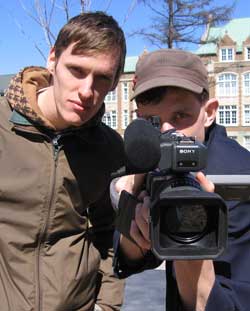Bringing stories out of Africa

Adam Azimov (left) is finishing his studies before he and fellow student Shaughn McArthur pack up their cameras to film the impact of Project Uganda’s volunteer work in northern Uganda.
Stephanie Bento
Twenty years of war in Uganda have caused 1.7 million people to flee their homes. Just last week, the United Nations reported growing potential for violent land disputes in Northern Uganda.
But that doesn’t seem to bother Concordia students Shaughn McArthur and Adam Azimov, who will be going to there with the Concordia Volunteer Abroad Program (CVAP) in May. The two graduates can’t wait to produce Project Uganda, a student film initiative that highlights the CVAP’s most valuable asset: its volunteers.
“The program [CVAP] is about the relationships between the aid workers and the local kids,” said Azimov, who is graduating from Communication Studies. “We are going to record what the people are going through by isolating one or two volunteers from various backgrounds and seeing how Africa changes them.”
The CVAP collects 50 cents per student credit to send over 100 volunteers each year to its Concordia Village located in the district of Gulu. So far, they collected $2 million towards the construction of a library, a day care center, a medical clinic, recreational facilities and housing units, attending the needs of local orphans and young mothers. Unfortunately, the program was not able to send volunteers last year due to political instability in the region.
“It is the first program of its kind in North America,” Azimov said. “It’s an in-house volunteer program that is fully funded by students. A lot of universities will be looking at Concordia as a model.”
Their goal is to present a Canadian perspective on the benefits of volunteering abroad. By documenting the voyage of 24 student aid workers, they hope to motivate other universities to embark on a similar program.
McArthur, whose world travels inspired him to pursue a career in journalism, said NGOs have a difficult time finding donors because people have grown desensitized to seeing images of starving African children on television. The students want to do things differently.
“It’s always been the white man behind the camera and the locals in front of the camera. We want to show people interacting. This is happening all over the world and in very effective ways,” McArthur said.
Project Uganda was awarded a scholarship from the Canadian International Development Agency (CIDA) through a publishing agreement with The Gazette. Concordia University Television (CUTV) has also contributed to the documentary by lending a camera, tapes and an editing facility for post-production, but the two still need sound equipment, more tapes and at least one more camera.
Azimov wants to make the documentary as raw and as uncut as possible. “We want to set up a type of diary where people can just turn on the camera and say what they feel without having us there to them make them feel like they are on the spot.”
As much as they want to plan ahead, they don’t know what to expect. “It’s absolutely exhilarating to be beginning a project and you cannot possibly foretell the outcome,” McArthur said.
They are offering producer credits to all who donate equipment or money. To help go to www.projectuganda.com